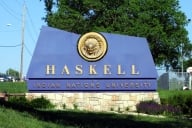You have /5 articles left.
Sign up for a free account or log in.
WASHINGTON -- The judges of this year’s Aspen Prize had a tight field on their hands, so they went with a shared crown for the top community college in the land.
Santa Barbara City College and Walla Walla Community College are the 2013 co-winners of the second edition of the prize, which debuted in 2011 with Valencia College snagging top honors. The two West Coast colleges bested 1,000 other two-year institutions for their “outstanding achievement” in student learning, degree completion, labor market success and helping more students from low-income and minority groups earn credentials.
Walla Walla was recognized in part for being adroit at responding to the local job market and helping its students train for well-paying jobs. And Santa Barbara earned high marks for its completion and transfer rates – roughly two-thirds of the college’s students graduate or transfer to four-year colleges, where they also tend to graduate.
The two winners each get $400,000. Rounding out the other top spots were Brooklyn’s Kingsborough Community College and Lake Area Technical Institute, which is located in South Dakota. Both of those colleges receive $100,000. The rest of the 10 finalists for the prize are listed here.
Aspen’s organizers have also accomplished a feat in higher education – they created a rating metric that doesn’t always make colleges look good and managed to do so without making too many enemies. The prize is generally seen as a feel-good honor that also pushes two-year institutions to collect and use meaningful data to improve their retention and completion rates.
The contest took a few hits when it was first rolled out. Some people complained that the proposed data sets weren’t up to the task. Others didn’t like the idea of a “ranking” for community colleges, which generally have open admissions. But that tension has largely subsided, observers said, and most in the sector have embraced the prize.
Some still have reservations, however. Kay McClenney, director of the Center for Community College Student Engagement, said she has great respect for the colleges that Aspen has honored. And she appreciates the recognition for community colleges, which don’t often get much time in the limelight.
Yet McClenney is no fan of the “simplistic language” of rankings.
“The notion that anyone can identify ‘the nation’s top community college,’ given the diversity of the institutions, their missions, their students, their resources and their state policy environments, does not hold water, either statistically or conceptually,” she said via e-mail. “These colleges are doing great work. So are many others around the country.”
Josh Wyner, executive director of the Aspen Institute’s College Excellence Program, said the prize’s organizers have listened to critiques. They created a data advisory panel, which includes experts from the federal government, advocacy groups, the American Association of Community Colleges (AACC) and top academics like Tom Bailey, director of the Community College Research Center at Columbia University’s Teachers' College.
“We’ve engaged the best analysts in the field,” Wyner said. “Where they’ve pointed at weaknesses in the data, we’ve made changes.”
However, that doesn’t mean the prize has been co-opted by the establishment. Aspen is an independent group, and the metrics it uses sometimes differ from what community college leaders might prefer. For example, AACC incorporates student transfer between community colleges into transfer and completion rates it tabulates. The Aspen Prize does not.
Wyner said the contest is an attempt to honor high-performing community colleges while also factoring in context, like where colleges are located and who they serve.
“The prize is about recognizing excellence,” he said. “But it’s also about setting a standard that others should aspire to.”
This year’s award comes 15 months since the first installment. In the future Wyner said the prize will be an every-other-year event. The longer period will be due in part to Aspen's efforts to use what it has learned.
Wyner said the group plans to put out information about what colleges are doing well. And, perhaps more importantly, Aspen is shooting to release a sortable database with information it has collected on more than 1,000 community colleges.
Aspen will define peer groups in the database, which, among other things, will show which institutions have improved their completion rates the most during the last five years.
“The target audience is going to be community colleges,” Wyner said.








